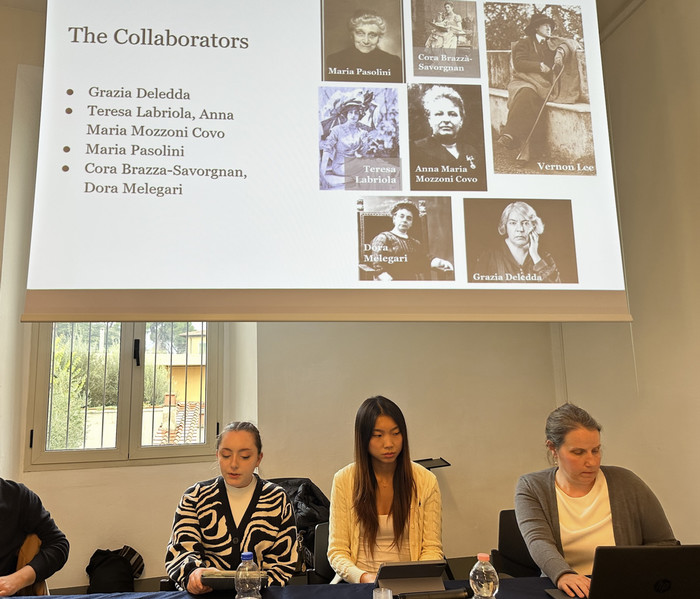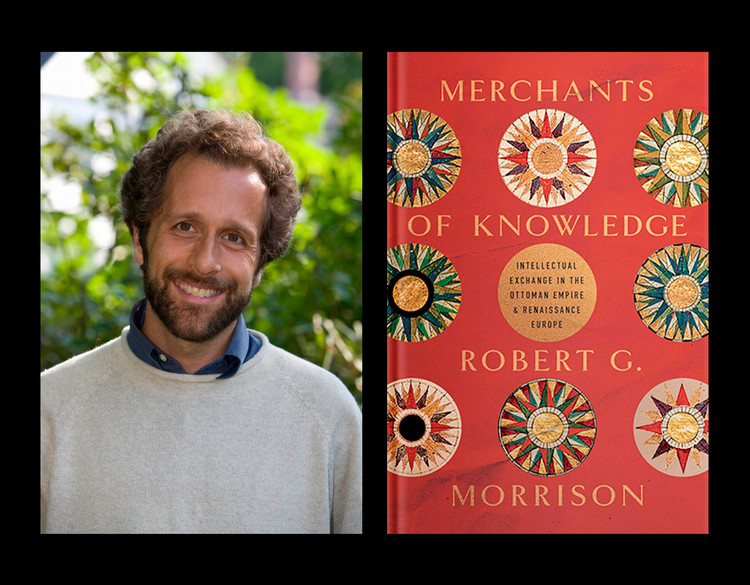Honors Day Address: Arielle Saiber
by Arielle Saiber, Assistant Professor of Romance Languages
May 11, 2005
Honors Day is about the present progressive tense of verbs: I am speaking, You are listening, He is looking at the ceiling, She is contemplating the floor, We are sitting here wondering what on earth Professor Saiber is going to be talking about.
We use this "present progressive" tense of a verb when we want to express something happening in the moment, but continuing for who knows how long into the future. There is a big difference between saying that you are writing a philosophy paper and saying that you write philosophy papers. In the first instance you are in the process of doing something, in the second, you refer to something that you do often. The first focuses on the means, the second on the ends. If you are Machiavelli, you don't care much about the means. If you are like most of us in this room, you actually do.
The experience of being acknowledged for your accomplishments and talents is, to say the least, rewarding. It is rewarding for you today, and it will be rewarding when you think about this day ten years from now. In fact, ten years from now you will be as deserving of the honor you are receiving today, as you are today. Receiving an award is an honor that just keeps giving. Although you will say later in life that you "received" an award for such and such a thing way back when in college, the fact of the matter is that by re-calling this re-warding event you are re-living it. As such, your award becomes, truly, a re-ward, and will ever be a part of you, written on your résumé, in your memory, and into your life. The word REWARDING has in its etymology, in its very roots, the concept of "seeing or watching again." An award re-cognizes what was already cognized, that is, what we all already knew about you: that you are exceptional.
A friend of mine recently brought up one of those killer rhetorical questions. He mused: "Why can't we remember the future; or rather, why does time seem to move only in one direction?" When he asked this we were at a café and I responded by staring (indefinitely) into my iced tea. As a literary critic I am entirely unequipped to answer this kind of thing (although this hardly stops me from imagining possible responses). Solutions and resolutions aside, there is something of immense value, I believe, in the mere act of posing such questions. It indicates a person's evolving relationship to, and awareness of, time.
While time itself may or may not be relative, our individual perception of time is unique and constantly changing. At times, time crawls and drags; at times, time flies. At times it seems to be lost or wasted; at times it seems to be free. And yet time does not adapt itself to our thoughts and desires, but rather mirrors who we are and what we are experiencing at that moment. Subsequently, I would like to propose to all of the remarkable young people in this room that you see in every moment and every event a reflection of you-in-process. Receiving an award is not something that just happens, finished, done. It is something that both began many years ago when you first fell in love with the subjects at which you have excelled, and one that will continue throughout your life. Receiving an award is a progressive event. Really progressive. Being re-warded for something shows you who you were, are, and will be: it shows you your future. You can, if you wish, re-member the future by living it fully in the present.
The great medieval philosopher Nicholas of Cusa (a German, but one who spent a lot of time in Italy, so I feel I can talk about him) famously said that in infinity, an infinitely large circle is a straight line. Perhaps as we proceed through our lives we travel along an imperceptible circle that carries us back to our beginnings once or often; or maybe there are no beginnings and endings, no forwards or backwards, but only movement. These paradoxes, it seems to me, can help us understand what is actually happening to you here today. They show you how extensive and extended — in both directions — your extraordinary achievements are. Knowing this, you should never doubt you were/are/will be worthy of honor and recognition for your accomplishments. Knowing this, you should begin to re-cognize all the other potentials you have as think-ing and do-ing be-ings — because perhaps you have already been there and done that! This award ceremony may be, in a sense, a memory, a déjà vu. Perhaps nihil sub sole novum — nothing is new under the sun; and knowledge is, as Plato theorized millennia ago, just recollection. If this is the case, then you already know everything and, by educating yourself, you merely need to re-member things. Living with this awareness can give us simultaneously a sense of great power and great humility. What could be more progressive than that?
Be, thus, ever-progressing with your talents, and with all that you do and love. Don't just live your life, but be living it. My wish for all of you is that you not only continue to have myriad successes (which if the present is any indication of the future, you certainly will), but that you are continually succeeding. Be examples of progressive presentness, present progressiveness, and masters in timelessness. Congratulations.



